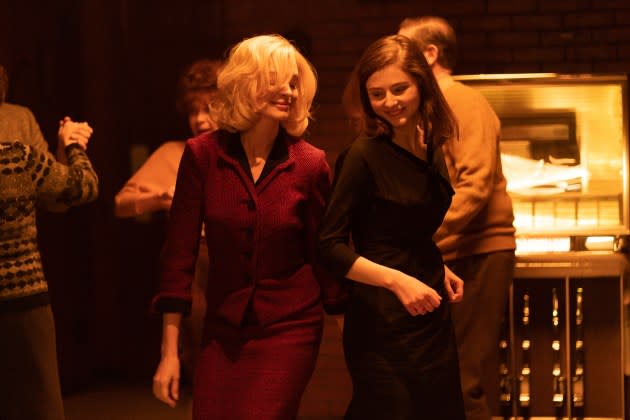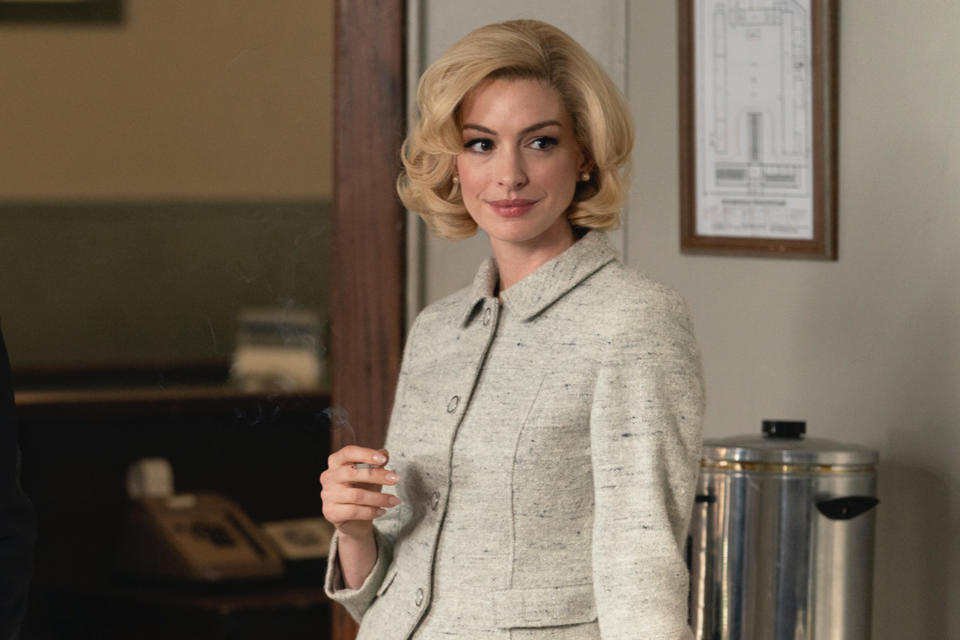‘Eileen’ Is One Genuinely F-cked Up Psychological Thriller
- Oops!Something went wrong.Please try again later.

You would not call Eileen Dunlop “innocent.” A twentysomething with a little college under her belt — even if she’d hadn’t dropped out when her mom died, she still would have become a secretary, what with this being the early 1960s and all — Eileen has her hands full taking care of her permanently drunk, ex-cop dad. She works at a prison for juvenile offenders in a blue-collar Massachusetts burg. If she spies a couple in a car parked near hers, she may shove a fistful of snow down the front of her skirt. (Whether that works to cool her down or provides an additional thrill is, frankly, unknown.) The young woman can take care of herself, thank you very much.
Still, when the hero of Eileen, William Oldroyd’s properly unnerving adaptation of Ottessa Mossfegh’s highly unsettling 2015 novel, meets the person who will end up presenting a path toward real empowerment, you can tell that any pinprick of innocence left in her is about to be lost. Before we meet her partner in crime (spoiler: the term is meant to be taken literally) we watch Eileen go about her business: driving her beat-up jalopy to her job, catching endless shit from her hard-ass boss, calming the police who show up when Pops is waving a gun in the street, replacing her father’s empty bottles with full ones.
More from Rolling Stone
'All Dirt Roads Taste of Salt' Isn't Just a Movie - It's an Immersive Experience
'Fair Play' Director Chloe Domont on Consent and That Shocking Ending
As played by Thomasin McKenzie, Eileen seems to have already seen too much without really having lived much life at all; the fact that this kind of character is a specialty of the New Zealand actor (check out Leave No Trace, Jojo Rabbit and Last Night in Soho) means we get to know her quicker than usual. Mossfegh herself cowrote the script with Luke Goebel, and she’s jettisoned the internal monologues that gave the book its narrative momentum. McKenzie is such an adept performer at sketching out people that are somehow both sheltered and jaded that you have a clear picture of her even before her dark twin shows up.

That would be Dr. Rebecca St. John (Anne Hathaway, in full Hitchock Blonde cosplay), the institution’s new psychologist. She’s a little older, comfortable in her own skin, likes a stiff martini and, if someone tries to paw her on the dance floor, will show you her mean right cross. Eileen, naturally, worships her from the get-go. And as the two begin to strike up a friendship outside of the office, you wait to see if the tension between them will take a turn toward the carnal. It’s hard to tell if Rebecca is flirting with Eileen or not. It’s equally tough to suss out if Eileen views Rebecca as a much-needed mother figure, a sophisticated alternative to the working-class lunks she usually fantasizes about, or simply a one-way ticket out of town. Maybe the answer is all of the above.
Eileen keeps playing this libidinous cat-and-mouse game, coyly watching as the stronger woman starts to show odd signs of weakness and the weaker of the two becomes more assured. Oldroyd cut his teeth in the British theater world and gifted us with a movie version of Nikolai Leskov’s novella Lady Macbeth (2016) that introduced much of the world to an actor named Florence Pugh. Complicated women are a comfort zone for him, it would appear; so are works that navigate moral gray areas with a half-broken compass. He’s not afraid to withhold gratification, or point viewers one way before quickly leading them down a different path. It’s a skill set that comes in handy once we get to the movie’s second half.
Because there’s an inmate at this youth correctional center that Rebecca has taken a particularly keen interest in. His name is Sam Polk (Lee Nivola), and he’s been incarcerated for brutally slitting his police-officer father’s throat. Considering half of the town is made up of cops, the Polk kid is especially unpopular with the locals. And when his mother (Marin Ireland) shows up for visiting hours one day and Rebecca inserts herself into the mix, Mrs. Polk leaves in a huff. Later, at a bar, Rebecca asks Eileen if the woman seemed more angry than usual. “Everyone’s angry here,” she replies. “It’s Massachusetts.” Still, the psychologist won’t drop the subject. “Some families are so sick and twisted,” Rebecca notes, “that the only way out is for someone to die.” Soon, Eileen gets invited over to her new friend’s place for a Christmas Eve dinner. And we immediately get the feeling that there’s a secondary agenda on the table.
Eileen has been, up to this point, a bruised slice-of-life drama, a dingy-retro period piece, and possibly a romance just waiting to rev its amour fou engine. Then it drops its mask and reveals itself to be not one character study but several, as well as a severely fucked-up psychological thriller. McKenzie begins to flex even more of her extremely well-honed actorly chops, Hathaway shows us that her ice-cold-blonde exterior houses an even chillier soul (though not one without empathy — it’s an important point to remember), and Marin Ireland delivers a showstopper of a speech that deserves a place in the Best Film Monologues canon. The fact that it’s willing to go deep, deep, deep into the heart of darkness sets Oldroyd’s film apart from a lot of similarly twisty throwbacks. While it eventually works its way back to the light, whether you consider the ending a happy one or not depends on your comfort with ambivalence. What is certain is that Mossfegh’s exploration of secrets, lies and liberation plays well on the page, but works even better on the screen. Good luck in getting this movie out from under your skin.
Best of Rolling Stone

